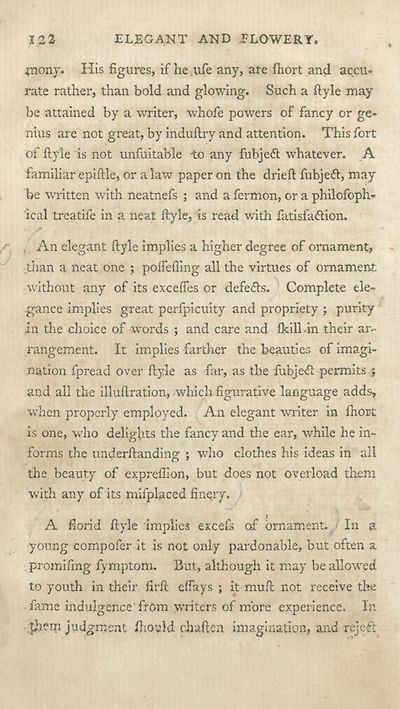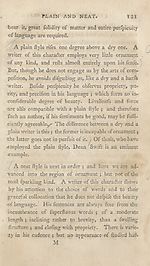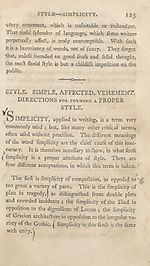Download files
Complete book:
Individual page:
Thumbnail gallery: Grid view | List view

22
ELEGANT AND ELOWERT.
^nony. His figures, if he ufe any, are fhort and accu¬
rate rather, than bold and glowing. Such a ftyle may
be attained by a writer, whofe powers of fancy or ge¬
nius are not great, by induftry and attention. This fort
of ftyle is not unfuitable -to any fubjeft whatever. A
familiar epiftle, or a law paper on the drieft fubjeft, may
be written with neatnefs ; and a fermon, or a philofoph-
ical treatife in a neat ftyle, is read with fatisfaftion.
. An elegant ftyle implies a higher degree of ornament,
than a neat one ; poflefling all the virtues of ornament
without any of its exceffes or defers. Complete ele¬
gance implies great perfpicuity and propriety ; purity
in the choice of words ; and care and (kill-in their ar¬
rangement. It implies farther the beauties of imagi¬
nation fpread over ftyle as far, as the fubje<ft permits j
and all the illuftration, which figurative language adds,
when properly employed. An elegant writer in (hor-t
is one, who delights the fancy and the ear, while he in¬
forms the underftanding ; who clothes his ideas in all
the beauty of expreflion, but does not overload them
with any of its mifplaced finery.
A florid ftyle implies excefs of ornament. In a
young compofer it is not only pardonable, but often a
promifing fymptom. But, although it may be allowed
to youth in their firft effays ; it muft not receive the
fame indulgence'from writers of more experience. In
$h?m judgment (hoyld chaften imagination, and rejefc
ELEGANT AND ELOWERT.
^nony. His figures, if he ufe any, are fhort and accu¬
rate rather, than bold and glowing. Such a ftyle may
be attained by a writer, whofe powers of fancy or ge¬
nius are not great, by induftry and attention. This fort
of ftyle is not unfuitable -to any fubjeft whatever. A
familiar epiftle, or a law paper on the drieft fubjeft, may
be written with neatnefs ; and a fermon, or a philofoph-
ical treatife in a neat ftyle, is read with fatisfaftion.
. An elegant ftyle implies a higher degree of ornament,
than a neat one ; poflefling all the virtues of ornament
without any of its exceffes or defers. Complete ele¬
gance implies great perfpicuity and propriety ; purity
in the choice of words ; and care and (kill-in their ar¬
rangement. It implies farther the beauties of imagi¬
nation fpread over ftyle as far, as the fubje<ft permits j
and all the illuftration, which figurative language adds,
when properly employed. An elegant writer in (hor-t
is one, who delights the fancy and the ear, while he in¬
forms the underftanding ; who clothes his ideas in all
the beauty of expreflion, but does not overload them
with any of its mifplaced finery.
A florid ftyle implies excefs of ornament. In a
young compofer it is not only pardonable, but often a
promifing fymptom. But, although it may be allowed
to youth in their firft effays ; it muft not receive the
fame indulgence'from writers of more experience. In
$h?m judgment (hoyld chaften imagination, and rejefc
Set display mode to:
![]() Universal Viewer |
Universal Viewer | ![]() Mirador |
Large image | Transcription
Mirador |
Large image | Transcription
| Antiquarian books of Scotland > Languages & literature > Abridgement of lectures on rhetoric > (138) |
|---|
| Permanent URL | https://digital.nls.uk/135468110 |
|---|
| Description | Thousands of printed books from the Antiquarian Books of Scotland collection which dates from 1641 to the 1980s. The collection consists of 14,800 books which were published in Scotland or have a Scottish connection, e.g. through the author, printer or owner. Subjects covered include sport, education, diseases, adventure, occupations, Jacobites, politics and religion. Among the 29 languages represented are English, Gaelic, Italian, French, Russian and Swedish. |
|---|

